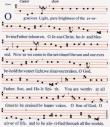Evening Prayer's "Phos Hilaron": "O Gracious Light"

 During Evening Prayer, both the Episcopal Book of Common Prayer (BCP) and the Lutheran Daily Prayer of the Church (DPC) encourage the saying or singing of the Phos Hilaron, the so-called “lamp-lighting hymn.” In the late fourth century St. Basil (c. 329 - 379) tells us that the Phos Hilaron was used as a hymn centuries before him. Some say that the martyr St. Athenogenes sang the Phos Hilaron in joy as he entered the flames. St. Justin the Martyr refers to the text of the hymn about 150 A.D. (Dialogue with Trypho). This is truly an old, old hymn, most likely the most ancient post-Biblical song we sing. Inasmuch as the ancient Jewish and Christian day always begins in the evening, the Phos Hilaron lets us enter each new day with praise and joy. The Eastern Churches have always sung this evening hymn daily, ever since the second century.
During Evening Prayer, both the Episcopal Book of Common Prayer (BCP) and the Lutheran Daily Prayer of the Church (DPC) encourage the saying or singing of the Phos Hilaron, the so-called “lamp-lighting hymn.” In the late fourth century St. Basil (c. 329 - 379) tells us that the Phos Hilaron was used as a hymn centuries before him. Some say that the martyr St. Athenogenes sang the Phos Hilaron in joy as he entered the flames. St. Justin the Martyr refers to the text of the hymn about 150 A.D. (Dialogue with Trypho). This is truly an old, old hymn, most likely the most ancient post-Biblical song we sing. Inasmuch as the ancient Jewish and Christian day always begins in the evening, the Phos Hilaron lets us enter each new day with praise and joy. The Eastern Churches have always sung this evening hymn daily, ever since the second century.O gracious Light,
pure brightness of the everliving Father in heaven,
O Jesus Christ, holy and blessed!Now as we come to the setting of the sun,
and our eyes behold the vesper
light, we sing your praises O God: Father, Son, and Holy Spirit.
You are worthy at all times to be praised by happy voices,
O Son of God, O Giver of life,
and to be glorified through all the worlds.
Inasmuch as Lutherans like to sing Evening Prayer, the DPC provides a musical setting for this translation:
Joyous light of glory of the immortal Father:
Heavenly, holy, blessed Jesus Christ.
We have come to the setting of the sun,
and we look to the evening light.
We sing to God, the Father, Son, and Holy Spirit:
You are worthy of being praised with pure voices for ever.
O Son of God, O Giver of life: The universe proclaims your glory.
The DPC also adds this note:
As this ancient hymn, Phos Hilaron, is sung, the candles on and near the altar are lighted. When the large candle is used, the candes are lighted from its flame. Paraphrases of the hymn—“O gladsome light, O grace,” O gladsome light of the Father immortal,” and “O brightness of the immortal Father’ face” may on occasion replace [the prayerbook’s] translation.
It is interesting to note that already in the second century, Christians are praising God as Father, Son, and Holy Spirit. Obviously the liturgies of the Church, shaped and formed by the Scriture’s testimony, were instrumental in helping the early Church formulate its Trinitarian creeds.
The Phos Hilaron is sung to our Lord Jesus Christ. Inasmuch as Phos Hilaron in Greek means “gladdening light,” we sing to Christ each evening with joy because the universe proclaims His glory as Son of God, the Giver of Life. In the BCP the Phos Hilaron is sung just before the reading of the Lessons; in the DPC, it is sung at the beginning of Evening Prayer.

1 Comments:
Andy,
Well said. I especially liked the note on how early the song is and how strong a Trinitarian element it contains. This kind of extra-biblical text should give pause to the scholars in the Jesus Seminar who argue that Christology was a late addition to the Jesus story, and Trinitarianism was even later.
The other day I was reading the evening prayers in the BCP, and noticed the last line of that translation: " . . . and to be glorified through all the worlds."
The particular phrase "all the worlds" caught my eye. We now think of God as the master and creator of "all the worlds" of the universe. Who knows how many races of beings sing praises on other planets in other, alien, languages--
OK, I'll admit it was very late at night when I was reading/praying, and that I was tired, but these thoughts do occur.
Thanks for the note. "Phos Hilaron" is a beautiful song in any translation.
Best wishes,
Mason Smith
Post a Comment
<< Home